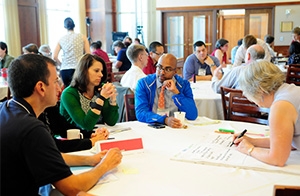
Participants at the DFM’s Community Health Learning Symposium strategize ways to integrate community health and residency training.
The UW Department of Family Medicine (DFM) welcomed over 60 patients, residents, physicians, staff, public health professionals, community organizations, academic partners and health system partners to its Community Health Learning Symposium, held September 4-5, 2014, at the Fluno Center in Madison.
Together, they identified best practices for integrating community health into residency education—work that’s essential to the DFM’s transformation into a department of family medicine and community health.
“Although this meeting was planned and included in the
“Expertise, different experiences, excellent planning and enthusiasm made for an exceptionally important and productive meeting,” she continued.
Insights from Experts
The symposium featured keynote speaker Julie K. Wood, MD, FAAFP, vice president for health of the public and interprofessional activities at the American Academy of Family Physicians (AAFP).
Dr. Wood talked about how the AAFP is helping family physicians lead health promotion, disease prevention, and chronic disease management initiatives in the communities they serve.
Faculty from three top family residency programs—Janice Benson, MD, from the University of Chicago; Freddy Chen, MD, MPH, from the University of Washington; and Viviana Martinez-Bianchi, MD, FAAFP, from Duke University—discussed how they are addressing community health education and practice at their institutions.
‘Health Occurs in Communities’
Participants then identified specific ways the DFM can empower family physicians to improve community health—and train residents to do the same. John Brill, MD, MPH, summarized and wove together themes that were identified in response to the questions, “In the future, how could family physicians be empowered to improve population and community health?” and “How might family medicine residents be trained to fulfill these expectations?”
Key strategies included:
- Providing longitudinal community experiences throughout residency;
- Developing ongoing, community-driven partnerships;
- Fostering faculty community health champions who can mentor and partner with residents;
- Using population health data to inform clinic practice and improve community health outcomes; and
- Strengthening interprofessional relationships to enhance training and care delivery.
Robin Lankton, MPH, CHES, the DFM’s leadership project manager and event organizer, said participants brought tremendous energy and enthusiasm to the event, which served as an important jumping-off point for the DFM, its partners and community stakeholders.
“Health occurs in communities,” she explained. “We know that a clinical office visit accounts for only about 20 percent of what contributes to health. People’s lives—in their neighborhoods, communities and families—all contribute to the other 80 percent.”
“By beginning to integrate family medicine, public health, and prevention at the community level, we can work to keep populations of people healthy.”
The Community Health Symposium was supported by the University of Wisconsin School of Medicine and Public Health and the Department of Family Medicine, with support from the U.S. Department of Health and Human Services, Health Resources and Services Administration grant D54HP23299.
Published: October 2014
